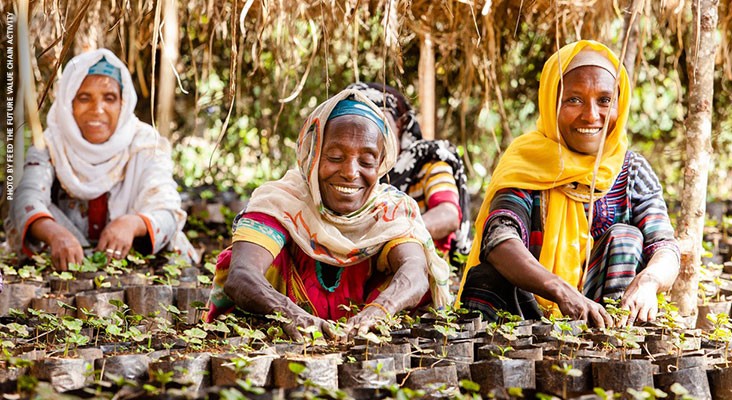Ethiopia
- History
- Our Work
- Foreign Assistance Data
- Dollars to Results
- PARTNERS
- Newsroom
- Fact Sheets
- WORK WITH US
Speeches Shim

Ethiopia’s economy is dependent on agriculture, which accounts for 40 percent of the GDP, 80 percent of exports, and an estimated 75 percent of the country's workforce. However, just five percent of land is irrigated and crop yields from small farms are below regional averages. Market linkages are weak, and the use of improved seeds, fertilizers and pesticides remains limited. Despite these challenges, agriculture-led economic growth that is linked to improved livelihoods and nutrition can become a long-lasting solution to Ethiopia’s chronic poverty and food insecurity.
Through Feed the Future, we are supporting the transformation of the agriculture sector by promoting higher productivity to generate greater incomes. Agricultural investments improve the competitiveness of value chains such as maize, wheat, coffee, sesame, chickpea, honey, potato, livestock and poultry. We also strengthen small- and medium-sized enterprises by providing access to credit and technical support. These activities bring jobs and income opportunities for rural households to lead brighter and more prosperous futures.
Our Feed the Future Strategy in Ethiopia focuses on three core components: inclusive and sustainable agriculture-led economic growth, strengthening the resilience of people and institutions, improving nutrition, and fostering a regulatory environment and private sector conducive to economic growth. Feed the Future activities also bring the talents of U.S. universities to address challenges, such as small-scale mechanization, post-harvest handling, agronomy, soil and water conservation, crop improvement, livestock breeding and health, household nutrition, and resilience.
We support the Government of Ethiopia’s Agricultural Growth Program, stimulating market-led agricultural growth and rural transformation to aid vulnerable parts of the country. In addition, we also work with the Government of Ethiopia to improve the enabling environment to support private sector growth and investment in agriculture.
The Government of Ethiopia’s Productive Safety Net Program (PSNP) is one of the largest safety net programs in the world. The PSNP is a major component of the Government of Ethiopia’s Food Security Program and plays a critical role in building the resilience capacity of chronically food insecure communities to drought and other shocks. The PSNP’s objective is to prevent the depletion of household assets, to stimulate markets and improve access to services, and to rehabilitate and enhance the natural environment through labor-based public works. The program has a target caseload of more than 8 million beneficiaries in over 300 woredas throughout Ethiopia. We are the largest bilateral donor to PSNP, and we also help families learn new skills and livelihoods to diversify their income sources and help them become self-sufficient so they no longer need safety net assistance.
KEY PROGRAMS
FEED THE FUTURE: Our assistance helps farmers improve agricultural production for both household consumption and market sales, helping families earn more while improving their diets. These efforts are aligned with and support the Government of Ethiopia’s Agricultural Growth Program, which aims to improve agricultural productivity and increase market opportunities for smallholder farmers. Through the U.S. Government’s Feed the Future initiative, we also work with chronically vulnerable households to graduate them from food insecurity by increasing income generation opportunities for farmers. In lowland areas of Ethiopia, we support pastoralists to benefit from livestock market value chains and new economic opportunities through entrepreneurship and employment opportunities. All of these activities decrease dependence on food assistance while transforming the economic potential of Ethiopia’s rural population.
Read more about Feed the Future in Ethiopia.
NUTRITION: Our integrated multi-sectoral nutrition program focuses on nutrition sensitive and nutrition specific interventions to reduce stunting. Working through our Feed the Future and health partners, the program supports the Government of Ethiopia's National Nutrition Program.
Read more about USAID and Feed the Future nutrition programs in Ethiopia.
ECONOMIC GROWTH AND TRADE: USAID is committed to making investments in Ethiopia that enhance the competitiveness of its economy and create more jobs to ensure that all Ethiopians are more resilient and can provide their families a better standard of living. In order to accomplish this, our mission is to advance an environment that supports increased private sector investment and growth. We endorse private sector development within our core Feed the Future activities alongside an array of standalone activities aimed at enhancing policies, expanding access to finance, and creating the necessary environment for private sector growth.
Read more about USAID economic growth and trade programs in Ethiopia.
HUMANITARIAN FOOD ASSISTANCE: When a crisis hits and households cannot feed themselves, we use emergency food assistance to save lives, reduce suffering and lessen the impact of shocks on overall food security. During an emergency response, we use in-kind food aid, locally or regionally procured food, cash transfers or food vouchers to ensure communities have access to food. Our support is coordinated with the Government of Ethiopia and the international community so that we know our resources are targeted to where they are needed most. We also support refugees fleeing conflict and crisis in their home countries who temporarily settle in Ethiopia.
Read more about USAID food assistance programs in Ethiopia.
KEY RESOURCES
- News: First-Ever Cup of Excellence Competition in Ethiopia Awards Grand Prize to Sidama-Based Coffee Producer
- Our Stories: A Family that Saves Together
- Press Release: USAID Signs New Five-Year Feed the Future Declaration of Partnership with Ethiopia to Improve Food Security
- Feed the Future Ethiopia Country Strategy: 2019-2023
- Overview of Feed the Future Ethiopia Country Strategy: 2019-2023
- Fact Sheet: USAID Ethiopia Agriculture and Economic Growth
- Fact Sheet: Using Digital Tools to Grow Agriculture and Financial Inclusion in Ethiopia


Comment
Make a general inquiry or suggest an improvement.